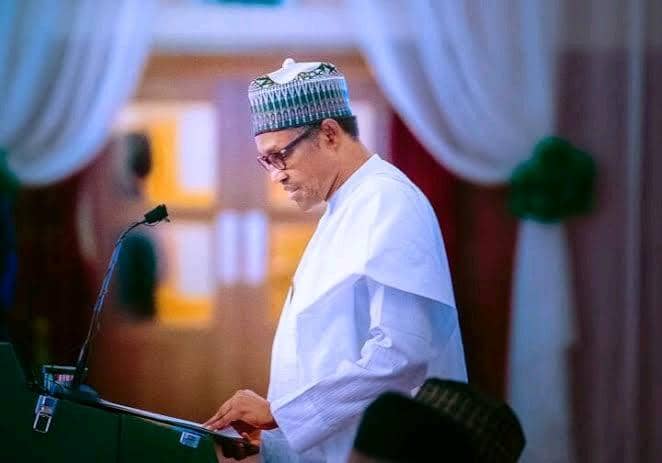Opinion
Buhari’s Post- Presidential Experience

|
Getting your Trinity Audio player ready...
|
Buhari’s Post-Presidential Experience
By Hussaini Ibrahim Sulaiman
May 29, 2023, has joined the queues of one the most memorable and historic moments in the lifetime of the immediate past President and Commander-in-Chief of the the armed forces of the Federal Republic of Nigeria, Muhammadu Buhari, (GCFR). This is added to the the first emergence of Muhammadu Buhari as Head of State under the military junta from 1983 to 1985 through a bloodless coup d’état he had orchestrated which saw the topping of late ex-president Shehu Shagari’s regime and his subsequent overthrow under the same scenario by Gen. Ibrahim Badamasi Babangida as well as the demise of his mother while in detention.
Subsequently, the sequence of events sprung spotlights on Buhari’s legacies by many of his colleague-closed associates and political pundits who hinged their faith predictions on the mounting milestones recorded during his regime as a military president. Escaping his fate of the alleged outlawed detention, and the transition of power to civilians in 1999, Buhari distanced himself from anything near to the helm of government which he saw as corrupted. The former president, however, lied to the law for a while before he eventually voiced out his interest in contesting in the 2003 general elections under the flagship of ANPP. Shortly afterwards the bigwig political gladiators in the politics of the country.
After his foray into politics, ranging from the Obasanjo, Late Alh. Umar Musa Yar’aduwa down to the Good-luck Jonathan administration in Buhari, pressed a series of condemnations against their legacies. The camp of the former President and those who openly sided with the opposition candidate of ANPP, announcing the incumbent Olusegun Obasanjo of the People’s Democratic Party (PDP) defeating Muhammadu Buhari by over 11 million votes, the news dominated the political discourse in the country pursuing PEPT to nullify the result by his supporters. That coerced Buhari and his legal team to rush to court challenging the election results for over eight years (2003 – 2007 – 2011) which claimed wereereereeree were wesivelygged.
The scenario had developed an uproar and opened a new wave in the chapter of the country’s political realm. Angry ones alleged nepotisms in declaring the results citing the turnout of of supporters of the former president who voted for him at both elections as a typified example that accentuated his victory, and happy ones who believed that Buhari lacked numerous qualities of good leadership and described all the elections as a fairest.
. Ibrahim Bello-Kano, (IBK), a lecturer at Bayero University Kano (BUK) explained that Buhari could not secure a win in the elections before 2015 because he wasn’t a mainstream politician and remained a political outsider until 2015. He stressed that his his his Phis his previoussousseputation as an insensitive draconian and authoritarian person did not help matters noting Buhari as a person lacked a pleasant, amiable personality.
He said: “He was haunted, arrogant, and so full of himself and his mythical indispensability. Many were either apprenticessrepulsed by that nasty personality in the Buhari persona. Many publications attesthors who had worked closely with him, eg. Dr Awwal Anwar and Senator Sani Hanga.”
As for the immediate past president’s eighth years’ regime, he revealed that: “Buhari was, by all accounts, a virtual peasant in his perspective on the Nigerian situation. For example, he kept thinking that all Nigeria needed was an agricultural transformation. He had no idea of what the economists call ‘sectoral linkages’ within a national economy whereby agriculture, industry, commerce, and banking or finance worked hand in hand.
He chided that the ex-president, Buhari received excellent blueprints here and there but never used them. Slowly, most of his most dogmatic followers began to lose confidence in him,
“Buhari borrowed so heavily and thoughtlessly that he raised the national debt burden by a factor of 10! 8). Buhari’s Naira redesign is the most malicious thoughtless and economically ruinous in recorded history. Finally: Buhari is by far the worst President Nigeria ever had. He virtually ruined the economy by relying on ridiculous neo-liberal economics, ruined the national currency, raised draconian taxes, instituted policies which eroded the living standards of the masses of the people, and allowed corruption to take its worst turn since 1960. Buhari temperamental despised the working class, the lectureship, and the urban poor. By the time he left office, many heaved a sigh of relief. His tenure will go down in Nigerian history as the most malicious and incompetent in statecraft.
“So that his post-2015 was dominated by people who hardly knew him. A good example here is Yahaya Hamma. One could also add Buba Galadima,” he lamented.
Mustapha Isa Kwaru, an Independent Journalist and Public Affairs Analyst, extolled Buhari, especially in the








